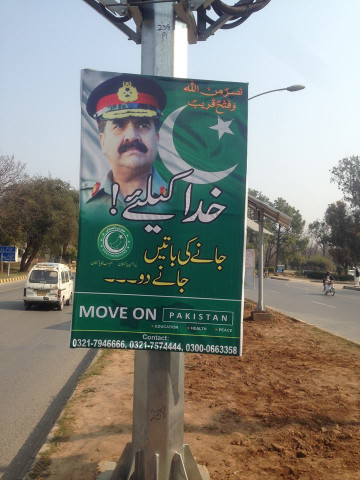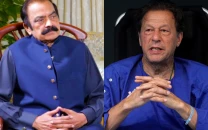Campaign beseeching army chief to extend tenure kicked off in Islamabad
Banners crop up on streets of the capital requesting the army chief to amend decision to retire on time

PHOTO: EXPRESS
The chief organiser of the campaign, Ali Hashmi, claimed thousands of banners have been displayed in the capital and different cities of Punjab, including Faisalabad and Sargodha.
I don’t believe in extension and will retire on due date: army chief
“The banners are being displayed as part of a campaign by a political party – 'Move on Pakistan',” Hashmi told The Express Tribune.
“We respect General Raheel’s decision to retire on the due date but his services for bringing peace in Karachi, Fata and Balochistan demand that he should stay as the army chief. Further, he speaks against corruption which is a biggest issue of the country. We believe that extension should be given to him because only he can address Pakistan’s issues,” he said.
Irked that political party leaders did not oppose the army chief’s decision, the chief organiser of the campaign said they took it upon themselves to convince General Raheel to change his mind.
No extension: Opposition leaders welcome move
“We thought political parties will urge the army chief to stay but they didn’t. So we came forward and now are going to intensify the campaign,” he said.
Hashmi added 'Move on Pakistan' chief Muhammad Kamran would address a press conference at 3pm in the capital today to request the army chief to extend his tenure.
Keen to leave lasting legacy, General Raheel 'never desired' extension
On January 25, General Raheel Sharif laid to rest speculation that he would continue to serve as the military chief beyond November 2016 when he is due to retire, insisting he preferred to relinquish the job – unlike two of his predecessors.
“I do not believe in extension and will retire on the due date,” Chief of Army Staff Gen Raheel said in an unprecedented statement.
By declaring his intentions well in advance, Gen Raheel became the first army chief since 1998 to doff his military uniform after completing his three-year tenure.
A senior military official, who is close to Gen Raheel, told The Express Tribune that the army chief had never desired an extension. “[Gen Raheel] believes institutions are more important than individuals.”
The official said the army chief wanted to leave behind a legacy to prove the point that ‘no one is indispensable’.
Gen Raheel, who was picked by Prime Minister Nawaz Sharif to replace Gen Kayani, is known for being a ‘clear-headed general’.
Another insider remarked that the army chief’s ‘clear thinking’ reflected in some of the crucial decisions he has made, such as launching a full-scale military offensive in North Waziristan Agency and supporting the democratic setup despite anti-government protests in August 2014.
When Pakistan Tehreek-e-Insaf Chairman Imran Khan and Pakistan Awami Tehreek chief Tahirul Qadri descended on Islamabad with tens of thousands of supporters to oust the premier, Gen Raheel assured the beleaguered premier that the army had no interest in removing him from power.
“History shows that [Gen Raheel] lived up to his words. This is because of his clear thinking,” said the military official. “And today’s announcement is also testament to the fact that he clearly knows what he has to do.”
Meanwhile, security and defence analyst Brig (retd) Mahmood Shah believes that by putting to rest all rumours, Gen Raheel would now focus on the most pressing issues, such as eliminating all forms of extremism and terrorism.
“In a way he has set a target for himself. This means he has 10 months to finish the job as far as the fight against terrorism is concerned, and it is good for the country.”
Gen Raheel reigns supreme on Twitter after announcing retirement date
For Dr Ishtiaq Ahmed at the Quaid-e-Azam University, however, Gen Raheel’s announcement was surprising. “There is increasing public perception that the army chief is vying for some political role, given the way he is being projected in the social and mass media.”
But the announcement not only quashed that perception but will also “boost the army’s credibility as the most powerful apolitical state institution”, he added.
The decision is also being viewed as a sign of the country’s gradual progress to a strong and sustainable democratic process.
“Pakistan has transitioned beyond the civil-military divide,” said Dr Ishtiaq. “The growing convergence in civil-military interests over national security, democratic process and regional policy augurs well for us.”



















COMMENTS
Comments are moderated and generally will be posted if they are on-topic and not abusive.
For more information, please see our Comments FAQ